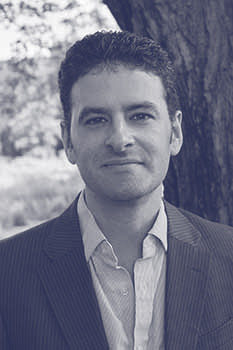Antony Millner

Antony works on a variety of issues in economics, with a focus on applications to environmental problems. His current research projects include work on climate change economics, discounting, and the political economy of policy choice.
Background
Antony completed his PhD at Oxford University in 2010, and spent two years as a Ciriacy-Wantrup Postdoctoral Scholar in the Department of Agricultural and Resource Economics at the University of California, Berkeley.
He also has a Masters degrees in Theoretical Physics and Applied Mathematics from Cambridge University and the University of Cape Town.
Research interests
- Environmental and Resource Economics
- Political Economy
- Welfare Economics & Decision Theory
Prospective PhD students
Antony welcomes prospective PhD students with shared interests, and strong backgrounds in economics or related disciplines.
– Visit the ‘Study with us’ page for further information on applying to be a PhD student with us.
Research
Research - 2018
Abstract We study a dynamic social choice problem in which a sequence of committees must decide how to consume a... Read more

Recent work on collective intertemporal choice suggests that non-dictatorial social preferences are generically time inconsistent. We argue that this claim... Read more

Research - 2017
In this paper, the authors’ treatment of uncertainty in environmental applications is motivated by two leading examples: climate change and biodiversity loss. They argue that in these cases uncertainty is sufficiently far-reaching that standard decision-making tools such as expected utility theory may no longer capture important aspects of our uncertainty preferences. Richer models of decision-making, which allow us to express lack of confidence in our information, may be more desirable. Read more

The authors of this paper study the question of how important it is to predict the distant future. Read more

Research - 2016
Abstract Experts and the general public often perceive environmental problems differently. Moreover, regulatory responses to environmental issues often do not... Read more

Paper demonstrates the potential benefits of model confirmation exercises for policy applications, demonstrating that the economic growth model used by a prominent BC-IAM had little predictive power over the 20th century. Read more

Agents exhibit pure intergenerational altruism if they care not just about the consumption utility experienced by future generations, but about... Read more

Research - 2015
We study collective choice when individuals have heterogeneous discounted utilitarian preferences. Two attractive properties of intertemporal preferences are indistinguishable for... Read more

This paper explores the relationship between beliefs and policy choices in relation to environmental regulation. Read more

Climate change is fundamentally an `out-of-sample’ problem – our available information does not tightly constrain predictions of the consequences of... Read more

Research - 2014
Intertemporal conflicts occur when a group of agents with heterogeneous time preferences must make a collective decision about how to... Read more

We model how heterogeneous beliefs about the uncertain consequences of long-run policy choices affect the incentives of incumbent governments. Read more

Stratospheric injection of sulphate aerosols has been advocated as an emergency geoengineering measure to tackle dangerous climate change, or as a stop-gap until atmospheric carbon dioxide levels are reduced. But it may not prove to be the game-changer that some imagine. Read more

Proceedings of the National Academy of Sciences of the USA. Disagreements about the value of the utility discount rate—the rate at which our concern for the welfare of future people declines with their distance from us in time—are at the heart of the debate about the appropriate intensity of climate policy. Read more

Review of Environmental Economics and Policy. Uncertainty is intrinsic to climate change: we know that the climate is changing but not precisely how fast or in what ways. Read more

Published in: Environment and Development Economics. Vol 20, Issue 03, June 2015, pp 380 – 406. DOI: 10.1017/S1355770X14000692, Published online:... Read more

Research - 2013
Environmental and Resource Economics. Economic evaluation of climate policy traditionally treats uncertainty by appealing to expected utility theory. Read more

NBER Working Paper. A group of agents disagree about the appropriate inter temporal preferences to use when exploiting a common productive resource. Read more

Journal of Environmental Economics and Management. Recent theoretical work in the economics of climate change has suggested that climate policy is highly sensitive to ‘fat-tailed’ risks of catastrophic outcomes (Weitzman, 2009). Read more

Abstract Expert elicitation studies have become important barometers of scientific knowledge about future climate change (Morgan and Keith, Environ Sci... Read more

Policy
Policy - 2010
Headline issue Climate change is one of the most significant challenges we face. It will impact the UK population, environment... Read more

Events
Events - 2017
Events - 2016
News
News - 2014
Injecting particles into the stratosphere to shade and cool the Earth will never stop climate change. This is the shocking claim made in the July issue of Nature Climate Change by an international group of prominent scientists Read more

A paper by Antony Millner (Research Fellow ) and Simon Dietz (Co-Director) of the Grantham Research Institute, and Geoffrey Heal... Read more


News - 2013
Experts from the Grantham Research Institute at the LSE will be speaking at the London Climate Forum, one of the largest student-led conferences on climate change and sustainability. Read more
Antony Millner, Research Fellow at the Grantham Research Institute, has been awarded the CESIfo Distinguished Affiliate prize. The Committee for the CESifo... Read more
Uncertainty is intrinsic in climate-change economics. This column argues that it’s here to stay. There will be no accurate predictive... Read more

News - 2012
Nature, Climate Change Read more


News - 2010
The answers to “How much should people sacrifice today for the benefit of those living several decades from now?” vary... Read more


